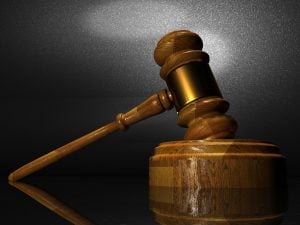By JOHN F. BANZHAF. Originally published at ValueWalk.

Youngkin Served With Legal Demand to Arrest Supreme Court Protesters; Virginia Statute Mandates Arrest; Police Can’t Simply “Monitor” and “Assist”
Virginia Governor Glenn Youngkin Served With Legal Demand
WASHINGTON, D.C. (May 9, 2022) – Shortly after announcing that he would send police to the homes of Supreme Court justices in Virginia at which pro-choice supporters had threatened to protest, but that he would instruct the police to simply “monitor the situation” and possibly “assist” others, Virginia Governor Glenn Youngkin and his aides were served with a legal demand that he enforce a Virginia statute which makes all such protests near residences criminal.
Q1 2022 hedge fund letters, conferences and more
The governor and the chief of police were put on formal notice that Virginia‘s § 18.2-419 makes any picketing near a residence a crime even if it remains entirely peaceful, and that ignoring a crime being committed in the presence of law enforcement officials violates their legal duty to arrest the violators, and the Governor’s sworn duty to see that the laws of Virginia are enforced and not flouted.
The statute mandates that: “Any person who shall engage in picketing before or about the residence or dwelling place of any individual, or who shall assemble with another person or persons in a manner which disrupts or threatens to disrupt any individual’s right to tranquility in his home, shall be guilty of a Class 3 misdemeanor.”
This is important, notes public interest law professor John Banzhaf, because the corresponding federal statute, § 18 U.S.C. 1507, only makes picketing or parading in or near a building or residence occupied or used by a judge criminal if it is done “with the intent . . . of influencing any judge . . ., in the discharge of his duty.”
While the intent requirement in the federal statute may seem to many like an irrelevant legal technicality, since the protesting groups have made their intent to influence Supreme Court justices very clear in their many public statements, it is the kind of legal technicality some may wish to try to hide behind if they seek an excuse to justify not making arrests where warranted, and/or refusing to take any other law enforcement action.
Thus it is not clear that any federal officers [e.g.. U.S. Marshals, Secret Service members, Supreme Court police, etc.] who might be on scene would – or even legally could – arrest persons who picket or protest near a justice’s residence in Virginia without direct evidence in their possession of the specific intent which the federal statute requires. It is even more doubtful that they would – or even legally could – arrest protestors for violating Virginia’s criminal statute.
Ruth Sent Us
The group supporting abortion rights, named “Ruth Sent Us,” has promised to protest on Wednesday at what they term “the homes of the six extremist justices.”
Roughly 100 angry chanting pro-choice protesters, occasionally blocking traffic. have already demonstrated outside the homes of two of the justices – Chief Justice John Roberts and Justice Brett Kavanaugh - who live in Maryland.
The protestors were described as “furious,” with one saying “The time for civility is over, man . . . Being polite doesn’t get you anywhere.”
The three justices whose homes in Virginia are scheduled to be picketed Wednesday are Clarence Thomas, Samuel Alito, and Amy Coney Barrett.
Professor Banzhaf, whose legal complaint led to a criminal investigation of former president Donald Trump in Fulton County, Georgia, and whose legal actions years earlier helped lead to the appointment of special prosecutors to investigate former president Richard Nixon, noted that there is legal precedent for using this statute against protestors.
As described just last year by U.S,Senator Josh Hawley regarding his home in Virginia:
“Tonight while I was in Missouri, Antifa scumbags came to our place in DC and threatened my wife and newborn daughter, who can´t travel. They screamed threats, vandalized, and tried to pound open our door.” The Senator confessed that, as a result, his family was “terrorized.”
As a result, a local magistrate found probable cause to believe that a violation of Virginia criminal law § 18.2-419 had occurred, and issued a legal summons.
Banzhaf also argues that the clear intent of § 18.2-419 is to have police immediately squelch protests near residences in Virginia – to protect the “good order of the community” as well as “tranquility and privacy” in the words of the statute – rather than permit the protest to occur and possibly escalate and only step in if the demonstrators become excessively violent or lawless.
In such a situation, when there can be widespread violence at a protest, subsequently trying to bring the situation under control is likely to cause injuries to demonstrators and to police, as well as claims of police brutality or overreaction, as well as permitting the intimidation of judges and others which the statute is designed to protect against.
Updated on
Sign up for ValueWalk’s free newsletter here.



